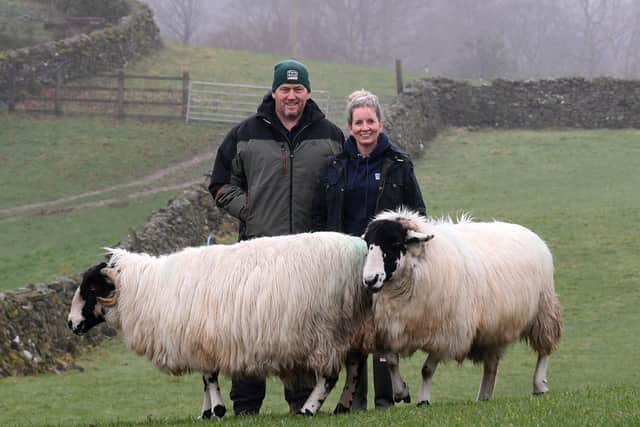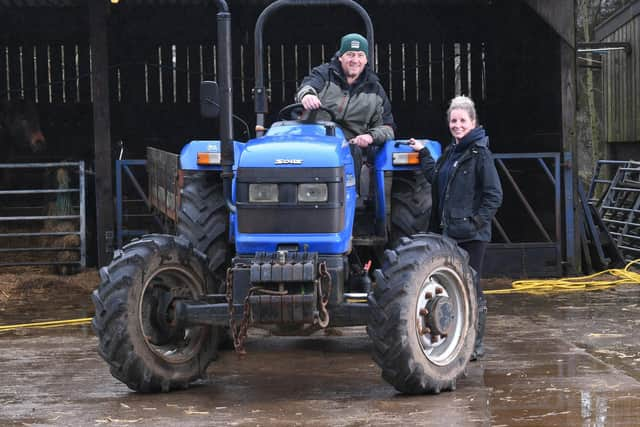Meet the Iraq veteran whose Yorkshire Dales farm is a rehabilitation haven for former soldiers
Brian Capstick spent 17 years in the Army latterly running a counter terrorism team in Yemen before leaving in 2005 for a career as a civilian in the security world in Iraq and Afghanistan until 2014 when he made the decision to come back home. He’s since been putting his experience into helping veterans, particularly those who’ve found themselves in trouble in a number of ways since leaving the Army.
What he has done at Farm & Fell at Birks Farm just outside Sedbergh, which he bought as a family enterprise to run with his father John in 2011, is create something that hopefully means problems can be lessened and a better life can be led.
Advertisement
Hide AdAdvertisement
Hide AdBrian says Birks is still a farm, with a flock 80 Rough Fell breeding ewes and a small herd of pedigree Galloway cattle on its 32 acres, but that it is now camping that makes it viable, alongside his passion for offering the right conditions for Army veterans with problems.


“Farming was the reason I joined the Army,” says Brian. “So, it’s somewhat ironic being back. I wanted to be away from it. I’d been force-fed it all my life. I don’t know how I’ve ended up here but now it links both sides of my life, farming and soldiering.
“The Yorkshire Dales National Park and the other national parks were founded to give people access to the countryside to decompress from the stresses of urban life and heavily congested living arrangements. That’s what I now offer through our little farm.
“Since 2014 I’ve been bringing veterans who may have been in prison or found themselves homeless, maybe suffered from alcoholism or addiction, into our family home and it has been the combination of rural life, values and standards, including the Sedbergh community that adds more value than ever you could quantify that has helped. Everywhere the guys go in Sedbergh the people support their transition back into working life, underpinned by the values of hard work and being judged on what they do, not what they may have done previously.
Advertisement
Hide AdAdvertisement
Hide AdThe catalyst for Brian’s work was working with Rory Stewart, then MP for Penrith & The Border who had been charged to undertake a review into veterans in the criminal justice system, there were 3500 at the time.


“The purpose of the study was to try and understand better why veterans sunk into social isolation, alcoholism, addiction, homelessness and prison,” says Brian.
“I was seized by the evidence from the Americans who said there was an incubation period t post-Vietnam of 10-14 years from point of trauma to manifesting in risk factors including prison and criminality.
“I wanted to understand more and began mentoring in prisons in the north west like Lancaster Farms, it used to be a working farm, using agriculture as a rehabilitative tool.
Advertisement
Hide AdAdvertisement
Hide Ad“When you followed the data it brought a stark realisation that the vast majority of the violent offenders that had been in the Army were engaged with children’s services pre-enlistment. The pattern of life they’d adopted post-service cited childhood experience, in a lot of cases, and was a factor, as well as service length. Those that had served under 9 years had a greater expectation to return to earlier life experiences.
“At the time reoffending rates were 46 per cent within 18 months of a veteran leaving prison. I saw an opportunity to use the farm as a transition vehicle and pick our guys up, work with probation and set a routine, getting them into nature and that daily meet around the farmhouse table where honest conversations happen.
“We now have up to six people at any one time and their maximum stay is three months. We work closely with Tom Harrison House in Liverpool, the only dedicated veterans’ alcohol and drug rehab centre in UK.
“I’m trying to prove there isn’t an inevitability that these people join the military to find family and be part of a team and then end up in the criminal justice system when they leave that behind and end up either homeless, an alcoholic or in addiction.
Advertisement
Hide AdAdvertisement
Hide Ad“That’s what our Rawthey Project does. It supports disadvantaged and vulnerable people who are ex-armed forces as they wrestle with things.
Brian firmly believes that Care Farming, which is how the genre he is working in is classified, is very much a part of agriculture today.
“Politicians and policy makers understand the cost of everything but the value of nothing, and the value of our farming way of life and value of agriculture beyond producing commodities and foods is being lost. I think what we are doing in our own way is going back to these values.
“Our farm’s main business now is camping, but my real passion is helping veterans have better lives. We have an ethos of letting our campers get involved with the livestock. It’s like an open farm in many ways. But what is really great is they also interact with our veterans.
Advertisement
Hide AdAdvertisement
Hide Ad“That public support for our veterans was what we expected and now we have an established camping operation, the farm and the care farming side of things that have merged.
Brian says he and his partner Grace are pushing on with the campsite, that also sees the farm now host an annual family festival in August, and that the animals still have their place.
“We are just tents and campervans, no caravans as we are on quite a narrow lane and don’t want them meeting.
“Covid impacted the farm business massively as all our pubs and restaurants were shut and we were left with livestock that should have been hanging upside down yet was still here to feed. And then came the troubles in Ukraine. A lot of people don’t join the dots but when that happened fertiliser prices trebled, animal feed went off the chart, particularly pig feed, and we had to forget about having pigs for a while.
Advertisement
Hide AdAdvertisement
Hide Ad“We’ve always farmed rare breeds, Berkshires and Large Blacks and we do bring pigs back in spring when tourists turn up.
“As Dales farmers we have to look at our values, in what we can offer, and stop always looking at ourselves as purely commodity producers.
Brian says he is delighted with the way in which Yorkshire Dales National Park has taken on board what he has done with Birks Farm.
“We’re doing really well, we are contributing to the success of Sedbergh’s economy and Yorkshire Dales National Park has been really supportive. We’re also now working with Farming in Protected Landscapes who are committed to help us.
Comment Guidelines
National World encourages reader discussion on our stories. User feedback, insights and back-and-forth exchanges add a rich layer of context to reporting. Please review our Community Guidelines before commenting.